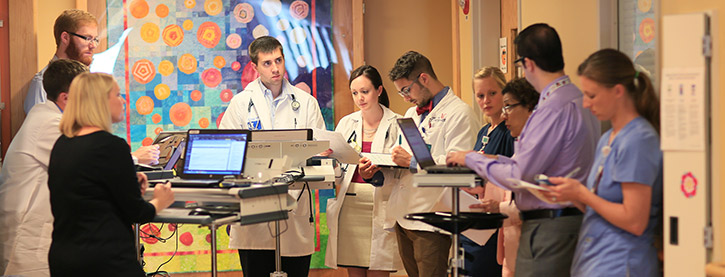Helping medical staff adapt to change
Physicians who have been on the medical staff at Cincinnati Children’s for a long time fondly recall the days when everyone knew each other, when community physicians rounded here regularly and felt like an integral part of the team.
Today, Cincinnati Children’s is a much different place – a leader on the world stage; the number three children’s hospital in the nation with 15,000 employees spread out over multiple campuses in the Greater Cincinnati area. We are ranked second in NIH funding, and we log north of 1.3 million patient encounters a year.
This rapid and continued growth, coupled with increasing regulations, fiercer competition; a constant stream of medical advances; and the uncertainty surrounding healthcare reimbursement have caused staff to feel stressed, devalued and disconnected.
Derek Wheeler, MD, Chief of Staff, and president of the medical staff, says, “We have good data from our recent physician survey that reflect how people are feeling, and we are in the process of putting together a plan to address issues we need to work on.”
The top three issues are:
- Physician burnout
- Lack of physician involvement in decisions that affect them
- Leadership’s visibility to the front line
Says Wheeler, “Physician burnout was no surprise. Nationally, the burnout rate is 50 percent, and I would guess it’s about the same here. Other hospitals around the city have similar concerns. We’re working with them to address work/life balance and physician wellness, which includes mental, physical and spiritual health.”
Medical staff membership
Wheeler also hears concerns about departures from the medical staff roster. “It’s true that the number of community doctors with active privileges has dropped, but in terms of overall numbers, medical staff membership has remained flat since we peaked in 2013.”
The perception of a decrease in overall medical staff membership may stem from who is leaving. Mike Farrell, MD, former Chief of Staff, who has spent his entire career at Cincinnati Children’s, offers his perspective.
“The old model used to be, you came here, you stayed here forever,” he says. “But everybody who comes here can’t stay here. Otherwise, we’d have a faculty of 10,000. Our role is to prepare the leaders of tomorrow, and that’s what we’re doing. When Mitch Cohen left to become chair of Pediatrics at the University of Alabama Birmingham School of Medicine, it was a great loss to Cincinnati Children’s. But we were happy for him. I think we have 10 graduates who are chairs at other institutions. It’s part of our mission to spread our expertise.”
He adds, “We are much more cognizant of our succession planning than we were a year ago. That should be part of our plan. If you don’t move up here, you are ready to succeed elsewhere. And if one of our best doctors leaves, we are not too seriously hampered.”
Cincinnati Children’s is attracting very bright residents, fellows and junior faculty who are eager to climb the academic ladder, he says. “I believe our turnover is comparable to what CHOP and Boston Children’s are experiencing.”
Many of the changes in healthcare that are happening today are beyond our control. Both Wheeler and Farrell agree it’s important to sort out what’s intrinsic to us that we can improve.
Says Wheeler, “We have drilled down through our survey results to the division level and shared the information we’ve received with each division director. The physician experience at Cincinnati Children’s is very important to us.”
Farrell has this advice for physicians, “Figure out what you like to do – research, teaching, patient care. Whatever your passion is, focus on that and find an outlet to decompress when your shift is over. Remember why you went into medicine in the first place. Despite all the hassles that drive me nuts, when I walk into a room with a family, I know I am doing my part for the mission of Cincinnati Children’s and the kids we serve. That’s what keeps me going, along with the opportunity to pass knowledge on to future generations of physicians.”




